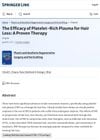 26 citations,
April 2019 in “Advances in wound care”
26 citations,
April 2019 in “Advances in wound care” Tannic acid helps wounds heal faster in rats by activating certain cell signals and reducing inflammation.
 26 citations,
March 2007 in “Clinical and experimental dermatology”
26 citations,
March 2007 in “Clinical and experimental dermatology” Pimecrolimus cream is not effective for treating alopecia areata.
 13 citations,
October 2017 in “Biomedicine & Pharmacotherapy”
13 citations,
October 2017 in “Biomedicine & Pharmacotherapy” Eclipta alba extract may help treat obesity by blocking fat cell formation and lowering blood lipid levels.
 12 citations,
January 2007 in “Acta dermato-venereologica”
12 citations,
January 2007 in “Acta dermato-venereologica” Europe needs a clear system to watch over cosmetics for safety and to make sure product claims are true.
 8 citations,
February 2022 in “Molecules”
8 citations,
February 2022 in “Molecules” Asparagus racemosus root extract reduced sebum and pore size in men but not in women.
 7 citations,
December 2022 in “Plants”
7 citations,
December 2022 in “Plants” Guava leaf extract may help treat hair loss and protect cells by blocking certain genes and fighting damaging molecules.
 3 citations,
May 2018 in “Experimental Dermatology”
3 citations,
May 2018 in “Experimental Dermatology” Young HS patients often have other physical and mental health issues, and research on HS covers a wide range of topics including genetics, triggers, treatments, and the need for more data.
 1 citations,
April 2024 in “Skin research and technology”
1 citations,
April 2024 in “Skin research and technology” Topical rosuvastatin and melatonin creams significantly reduce psoriasis severity and are safe.
 1 citations,
January 2024 in “Cellular & Molecular Biology Letters”
1 citations,
January 2024 in “Cellular & Molecular Biology Letters” Adipose-derived stem cells help heal burns but need more research.
1 citations,
April 2022 in “Acta histochemica” Pumpkin seed oil promotes hair growth and improves hair texture without harmful effects.
 August 2024 in “Frontiers in Nutrition”
August 2024 in “Frontiers in Nutrition” Antioxidant-rich diets may reduce hair loss risk, while pro-inflammatory diets may increase it, especially in women.
September 2023 in “International journal of molecular sciences” Pinus densiflora extract may help improve memory and reduce brain inflammation.
 January 2022 in “Springer eBooks”
January 2022 in “Springer eBooks” Platelet-rich plasma therapy helps increase hair thickness and slow hair loss.
 January 2018 in “Springer eBooks”
January 2018 in “Springer eBooks” Cancer treatments targeting specific cells often cause skin, hair, and nail problems, affecting patients' lives and requiring careful management.

Cosmetics can help with mild skin problems and daily care but must be used carefully to avoid skin irritation.
 188 citations,
March 2018 in “Frontiers in Immunology”
188 citations,
March 2018 in “Frontiers in Immunology” Regulatory T-cells are important for healing and regenerating tissues in various organs by controlling immune responses and aiding stem cells.
 165 citations,
February 2014 in “Phytotherapy Research”
165 citations,
February 2014 in “Phytotherapy Research” Myrtle has various health benefits and potential for medicine development.
 113 citations,
July 2015 in “Journal of Cosmetic Dermatology”
113 citations,
July 2015 in “Journal of Cosmetic Dermatology” Platelet-rich plasma may help with hair growth and skin quality but more research is needed to confirm its effectiveness.
 101 citations,
October 2016 in “Nanomedicine: Nanotechnology, Biology and Medicine”
101 citations,
October 2016 in “Nanomedicine: Nanotechnology, Biology and Medicine” Fullerenes show potential in skin care but need more safety research.
 78 citations,
October 2020 in “Experimental Dermatology”
78 citations,
October 2020 in “Experimental Dermatology” Hidradenitis suppurativa is caused by genetic factors, inflammation, bacteria, hormones, and lifestyle factors like obesity and smoking.
77 citations,
September 2017 in “Journal of Investigative Dermatology” TRPV3 in skin cells causes inflammation and cell death.
 66 citations,
March 2009 in “British journal of surgery”
66 citations,
March 2009 in “British journal of surgery” Hidradenitis suppurativa treatment should be tailored to the individual, with quitting smoking being important.
 47 citations,
July 2014 in “European Journal of Pharmaceutics and Biopharmaceutics”
47 citations,
July 2014 in “European Journal of Pharmaceutics and Biopharmaceutics” Scientists created a gel with nanoparticles to deliver medicine to hair follicles effectively.
 42 citations,
September 2018 in “Journal der Deutschen Dermatologischen Gesellschaft”
42 citations,
September 2018 in “Journal der Deutschen Dermatologischen Gesellschaft” Adult female acne requires a comprehensive treatment approach, including medical options and lifestyle changes, with attention to psychological well-being.
 39 citations,
June 2017 in “Journal of Applied Research on Medicinal and Aromatic Plants”
39 citations,
June 2017 in “Journal of Applied Research on Medicinal and Aromatic Plants” Plant-based ingredients are effective and safe for modern skincare products.
 38 citations,
June 2015 in “Expert Opinion on Therapeutic Targets”
38 citations,
June 2015 in “Expert Opinion on Therapeutic Targets” Blocking the prolactin receptor might help treat various diseases, but more research is needed.
 36 citations,
June 2014 in “Experimental Neurology”
36 citations,
June 2014 in “Experimental Neurology” Teriflunomide is an effective and generally safe oral treatment for relapsing MS, reducing relapses and slowing disability progression.
 35 citations,
August 2001 in “Journal of Cutaneous Medicine and Surgery”
35 citations,
August 2001 in “Journal of Cutaneous Medicine and Surgery” Tacrolimus is effective for various skin conditions with fewer side effects than cyclosporine.
 27 citations,
December 2015 in “Mayo Clinic Proceedings”
27 citations,
December 2015 in “Mayo Clinic Proceedings” The document concludes that lifestyle changes and medical treatments can significantly reduce symptoms of Hidradenitis Suppurativa, a chronic skin condition.
 26 citations,
May 2021 in “International Journal of Molecular Sciences”
26 citations,
May 2021 in “International Journal of Molecular Sciences” Cheonggukjang may help prevent and manage various diseases and improve overall health, but its odor and safety concerns need addressing.



























